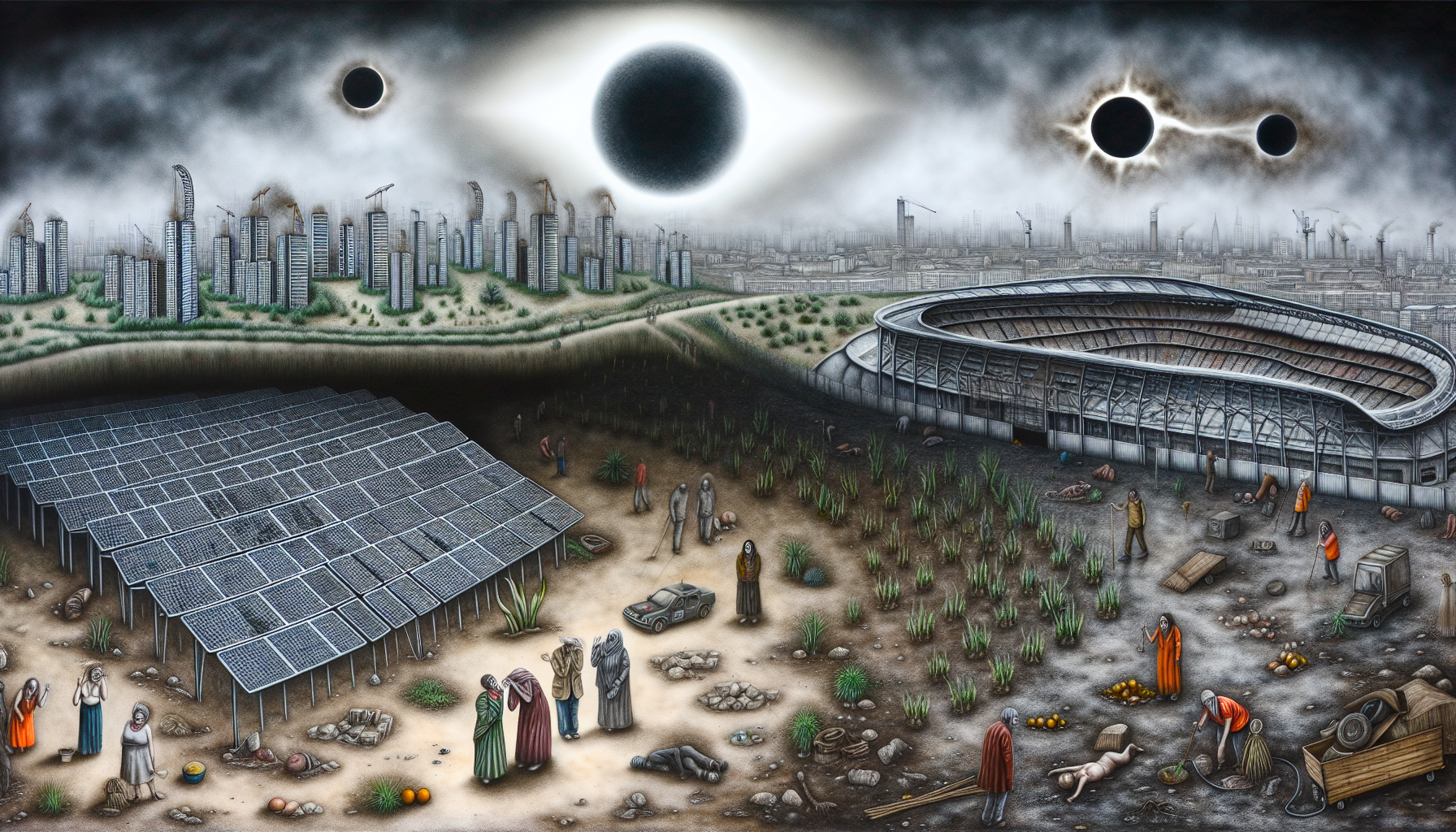In a world marred by the harrowing specters of climate calamity, ‘Eclipses Without Romance: The Cost of Solar Neglect’ paints a melancholic picture of a sun’s majesty eclipsed not by the moon’s poetic interlude but by humanity’s relentless dereliction. Gazing above, where the skies were once a canvas for celestial beauty, we now find them, on occasion, oddly obscured. Not by natural phenomena, but by smog and detritus: the hallmarks of our solar neglect.
Once the limitless wellspring of energy, kinetic and warming, the sun has stood as humanity’s unflagging companion, a beacon for poets and a life-giver for the green that spans beneath. But we have failed to match its constancy with respect or any semblance of stewardship. The skies grow dim. Solar panels, once the heralded icons of a sustainable path forward, now stand as forlorn monoliths, covered in particulates, clawing at the dregs of light that manage to penetrate the murk.
It’s not the scarcity of sunlight that plagues us—it’s our own failure to harness it. Rooftops that could have been shimmering fields of photovoltaic cells are barren landscapes, strewn with litter. The ambitious installations of solar farms—endless rows of promise—are now pockmarked with the decay of disuse and abandonment.
And with our blind eye turned towards this decay, we are haunted by the rolling blackouts, the cities gone dark, the food deserts blooming from the barren grounds where energy is too scarce to power the engines of agriculture. This is as much an energy famine as it is a failure of vision. Where we once imagined a future powered by the unyielding force of the sun, we now live a present dimmed by our refusal to act on what was once just a distant, dystopian premonition.
‘Apocalyptic Harvest – Can Science Feed a Ravaged World’, published just yesterday, discussed the similarly dire consequences of our environmental negligence on food sustainability. This narrative continues the exploration into our ill-preparedness in surviving and thriving under the self-inflicted shadows we cast over our power supply.
The fallout of our solar neglect isn’t just seen in our crumbling architecture and the stuttering heartbeat of a once-vibrant energy grid. It extends into the quietus of biodiversity. Remember the bees, intoxicated by our poisons and lost in the erratic climates we’ve sired, unable to navigate through the desolation of crops? Now imagine the pollinators’ plight compounded by a lack of the sun’s elixir, their little bodies cold, lost, and failing in the gloom that pervades a world deprived of sustained light.
In the gloaming of our era, children are raised in worlds lit by fluorescent bulbs, never knowing the kiss of a sunbeam upon their cheeks. The irony sits thick as coal dust in our lungs. We, who crafted tools to capture the stars, now find ourselves in the shadow, grappling with tools that hunger for a light stifled by our own making.
But imitation sunlight is a poor substitute for the real celestial fire. Our circadian rhythms, so tied to the diurnal dance, are awry. The result: a cascade of maladies, both mental and physical. We are creatures of the light, defiantly living in the self-imposed dusk.
Disturbingly prescient is the link between energy dearth and the erosion of hope. With solar neglect comes a failure to power schools, hospitals, and homes. As our machines lie still, so too, it seems, does progress. A mother, whilst consoling her child in the cool perpetual twilight of a powerless homestead, whispers stories of a brighter time, but even her hope dims as the grid coughs its last.
To conclude, let it not be said that we looked to the heavens and turned away, unconcerned. Our legacy lies not just in the remembrance of our triumphs but now, ever more starkly, in the enduring shadows of our indiscretions. In ‘Eclipses Without Romance: The Cost of Solar Neglect’, we unravel the repercussions of such an oversight, a stark warning of a darkened world that no longer dreams of harnessing the day.
For we have eclipsed ourselves, not with romance, but with recklessness.
